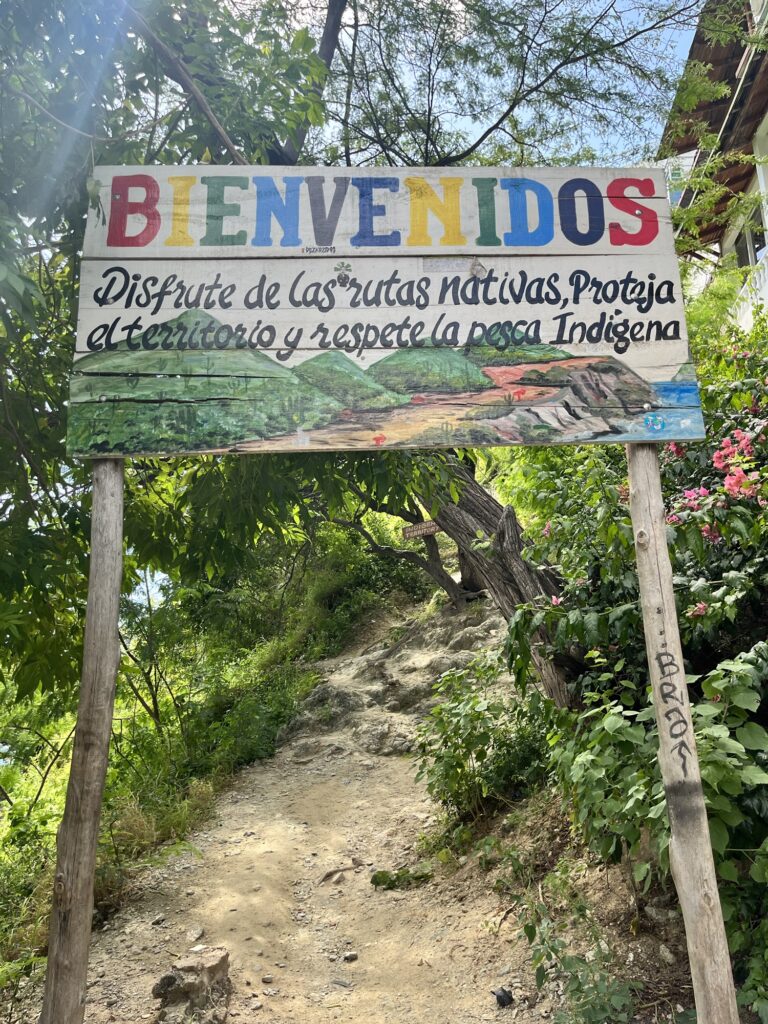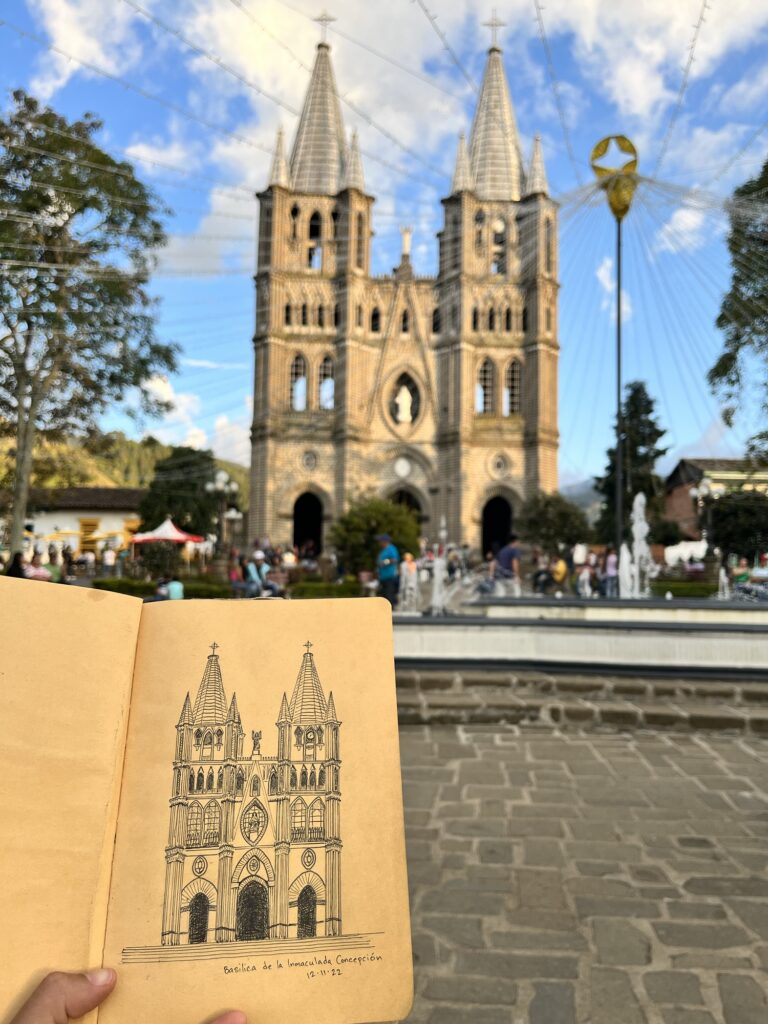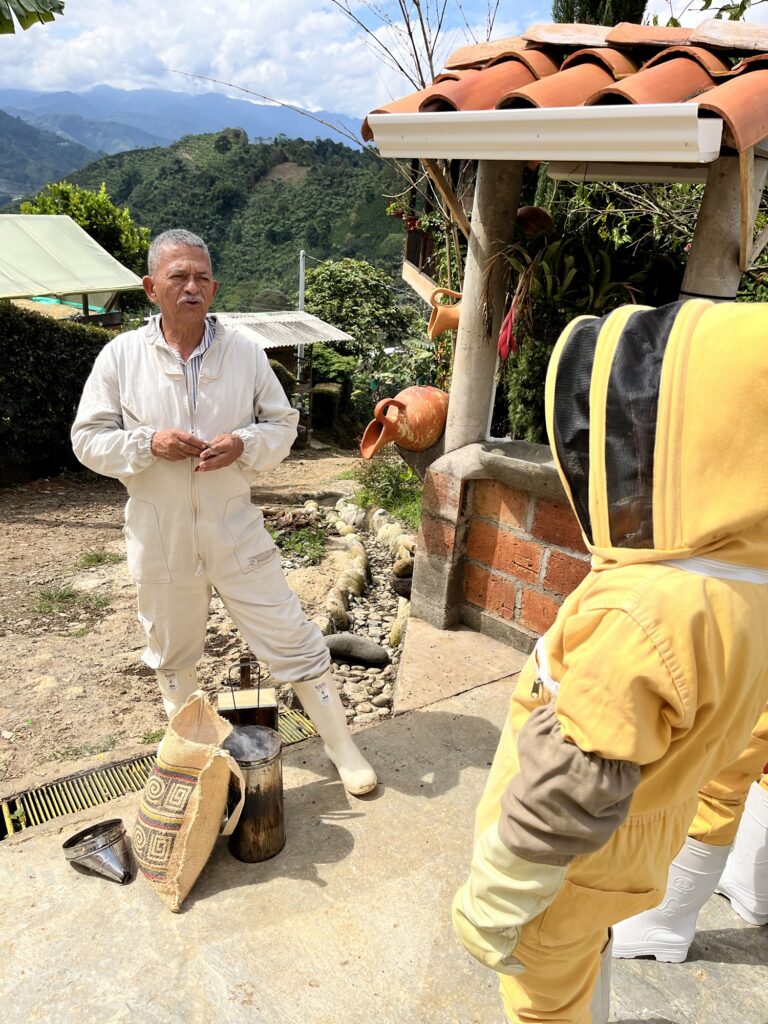Seven Months Of Travel
As of January 14th I’ve been traveling for seven months. I’ve visited nine countries, with my longest stints being six weeks in Guatemala and now, over three months in Colombia. It feels like a good time to take stock of my progress in learning Spanish. I’ve come a long way from my terrified first hour in Guatemala City, struggling to communicate with airport employees to figure out how to get transportation to Antigua. I feel like I’ve also made significant progress since I last wrote about this learning process. I think I’m comfortable calling myself an “intermediate” speaker at this point. Fluency still feels a long way off, but I’m feeling more comfortable using Spanish in the wild. I’m listening to books, learning songs, making friends, and coordinating plans in Spanish. I’m struggling every day, but also learning every day, and I’m learning to be more gentle with myself and to hold less tightly to expectations. Learning Spanish is a long process, in fact, it’s something I’ll probably never be done with. So, it’s best to just enjoy the ride.
Regional Differences
I mentioned in my previous post about learning Spanish that something I’ve found really difficult has been adjusting to the different variations of Spanish spoken in different countries and regions.
A local guide in Antioquia, Colombia, named Robinson (yes, apparently there are Colombians named Robinson) showed me this video, which depicts two guys first singing with an exaggerated gringo accent (around here, gringo means anybody from the US or Canada, racial background not withstanding). They go on to describe the myriad ways that Spanish vocabulary varies by region, in ways that can be confusing, embarrassing, frustrating, or all three. For example the words that mean “straw” and “jacket” in some countries are colloquially used to refer to masturbation in others.
The big regional differences are part of the reason why I’ve stayed in Colombia for so long. I think at my current level, it makes sense to just pick a type of Spanish, and get to know it better. The accent in central Colombia, especially in a Medellín and Bogotá is supposed to be very clear and easy to understand. I’d argue that Guatemala, Perú, and Ecuador were easier, just in my personal experience. But Colombia has been way easier than Argentina and Uruguay, where the “ll” is pronounced “sh” instead of “y”, or the Dominican Republic and Puerto Rico, where they often drop consonants, so “pescado” becomes “pescao” or even “pesao.”
La Lenguage Paisa
I’ve spent the most time in the western central part of the country, known as the Paisa region. It includes the departments of Antioquia, Risaralda, Quindío, and Caldas. The people around here are known as Paisas also, and in terms of language, they have a lot of their own Paisa-isms. For example, “Qué pena,” usually means “What a shame,” but for a Paisa it is “Sorry.” Paisas also say, “Qué más?” which literally means, “What else?” but here it’s a greeting, with the same function as “Cómo estás?” As I learn, I’m trying to strike a balance between getting a good feel for local Paisa words and phrases, and not getting too attached to them. There are lots of things that are used frequently in this area that Spanish speakers in other places just wouldn’t understand. My hope is to develop my language skills to be able to communicate with as many people as possible.
Learning to Listen
As I learn and progress, I’m finding that different areas of my language development progress at different rates. Learning to speak, listen, read, and write are all related, but if I’m practicing one more than another, I can pretty quickly see deficits developing. A few months ago, I think I had a pretty decent vocabulary for a beginner (from lots of Duolingo), so I could (very slowly) tell people more or less what I was thinking or what I wanted, but I hadn’t had much conversation experience, so when people responded to me, I had a hard time processing and understanding what they were saying.
Let’s be real. I still struggle with that. I frequently have to ask people to repeat themselves. Or I have to slowly repeat to myself what they just said, to break down the sentences and identify the individual words and verb conjugations. In general, I have to be paying close attention to pick up on what people are saying, and even then, I’m often only getting the gist.
But still, I have noticed that my listening comprehension has gotten a lot better of late. It’s something that I’ve been focusing on, and now it isn’t lagging behind my speech. Instead, I’m finding myself in a lot of group conversations where I’m just listening a lot, and not contributing much. Even when I understand what people are saying, sometimes I’m self-conscious about how slowly and deliberately I need to speak—it can snag the flow of a conversation.
Besides just having a lot of conversations, I’ve also been supplementing my listening practice with technology. I recently finished listening to Harry Potter y La Piedra Filosofal en español. I listened at 85% speed, and there were lots of words I didn’t know, but knowing the story well helped me to fill in the blanks.
Speaking with Confidence
My speech is improving too. I make a lot of mistakes, but I think the fact that I sometimes notice them now is a good sign. But when I don’t notice them myself, I’m super appreciative of conversation partners who correct me. Not everyone is up for it, but I’ve encountered a lot of people who are willing to help me out as we talk together. When people understand my level of Spanish and they understand my needs based on that, they usually speak slowly and clearly, and try to use simple words and less colloquialisms. They repeat and rephrase for me as needed. It’s truly an act of kindness, and I have so much more understanding and empathy now for people who are learning English.
In general, I’ve felt more at ease in my speech recently. Things are coming a little faster to my mind, and I’ve felt less self-conscious (sometimes). I’m having fun using what I’ve learned out in the world. I’ve continued to record short videos of myself speaking in Spanish, so I can look back on my progress later.
Reading and Writing
Reading feels easier a lot of the time. I think it’s partly because those synaptic pathways in my brain are already well developed. I’ve noticed I learn vocabulary a lot faster if I read a word, or at least know how to spell it. I can also often see a word I don’t know, and visually note that it’s similar to something in English, and make inferences from there. And it’s a lot easier to identify words I already know in writing than in speech, where words often blend together.
Writing is also easier than speaking for me. This is true in English, too. I can craft an elegant argument in writing (in English). I take my time and never get flustered, and I can go back and make edits. Compared to speaking Spanish, where it’s hard to conjugate verbs and properly gender adjectives on the fly, I make fewer errors when I’m writing (or I can at least identify them and fix them before I send a text or email). Lately I’ve been practicing by typing what I want to say, then running it through my translation app to see if what I’ve written makes sense. In general, lots of businesses in Latin America use WhatsApp as one of their primary forms of communication. So, when I need to get in touch with a business, I often have the option of texting them, which tends to be easier than calling.

Weak Spots
As I move through the world, communicating in Spanish, I’m very conscious of my weak spots—those places where I run into the limits of my skills in a given area. Right now, I think I can pinpoint two things that would greatly improve my capacity to get by in Spanish.
Vocabulary
Expanding my vocabulary would help immensely with my listening comprehension. When people speak to me and I only know half of the words in each sentence, it really hampers me. Also, sometimes I’m talking to someone and I need to talk my way around a word I don’t know. It can be kind of fun to be able to define something or describe its use in order to have the other person provide me with the word in looking for. But it would be a lot easier to just know the word.
Advanced Grammar
For the most part, expressing myself isn’t a huge problem. When I don’t know how to say something properly, I can usually just phrase it another way and whoever I’m talking to will more or less understand what I mean. But I’m pretty conscious of some areas where a better understanding of more advanced grammatical structures would serve me well. For example, I find myself wanting to use subjunctive verbs a lot, to describe hypotheticals, desires, and things that haven’t yet happened. I have a basic understanding of how this works, but I need a lot of practice, and I’m conscious that I’ve been neglecting it.
So Many Emotions
In addition to keeping track of my technical progress, it’s kind of crazy to observe in myself the emotions that come along with learning something from scratch. The last time I started something as a complete beginner and pursued it with this kind of dedication was when I was learning Muay Thai. And a lot of the feelings that are coming up right now are familiar.
There’s a lot of intimidation and embarrassment sometimes. It’s hard to sit with this knowledge that my skills are sorely lacking, while I’m surrounded with people for whom the thing I’m struggling to learn is easy. I like being good at stuff. Everybody does. And when I’m trying hard but still coming up short, it can be pretty frustrating.
I’m confused a lot. Guessing a lot. Feeling lost and sometimes a little alone in that, like when I’m sitting on the sidelines of a group conversation, not understanding quite enough to participate fully. But I’ve known plenty of folks who were in my position, learning English in the US. I’ve seen people grow past this phase, and I know I will, too.
It helps that there are enough bright moments to keep me motivated. For every time I’m frustrated or lost, there’s another time when I feel elated. Like when I take a step back and notice that I can accomplish things with Spanish that I couldn’t have a few months ago. I’ve had lovely conversations and made friends with people who don’t speak any English–like the lawyer who I met in a Santa Marta hostel who fights for social justice, or the farmer and his young daughter who were interested in the drawing I was working on in the central plaza of Jardín. I’ve also been on some tours recently where I was learning in Spanish about stuff I love and am really interested in, specifically ecology and handicrafts (the featured image in this post is from an all-Spanish bee tour with a third-generation beekeeper). Being able to do that kind of stuff just lights me up inside, it’s awesome. There’s also a little burst of pride when people who just met me compliment my skills. They’re mostly just being nice, but it still feels great.

Next Steps
So, what’s next? When I look at where I’m at, I feel like I’m on the edge of leveling up. I know that if I buckle down and get really academic for a while—like when I first arrived in Guatemala to attend Spanish school—I’m going to see big returns. Dedicating some serious time and brain power to the areas that I can tell are holding me back is a sure path to growth. It’s intimidating. It’s going to be hard. But I want this so badly. When I come to the end of my year in Latin America, I want to have accomplished something I’m really proud of, and learning Spanish is that something.

Muy bien, senorita
Gracias, papá!
👏🏼 well done, Sachi! You are crushing it!